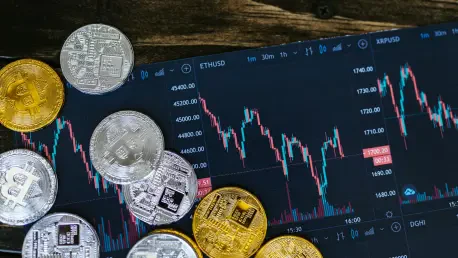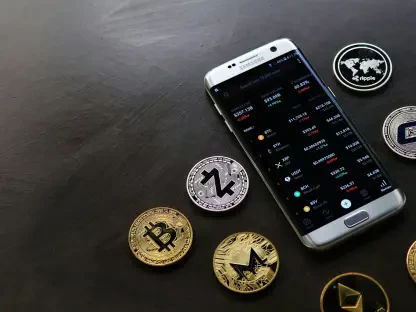Imagine a world where investing in high-growth private companies like Animoca Brands, a Hong Kong-based Web3 powerhouse, is no longer reserved for the elite with deep pockets and exclusive access. On September 30, this vision took a significant step toward reality with the announcement of a groundbreaking deal to tokenize Animoca’s equity shares on the Solana blockchain, facilitated by the investment platform Republic. This initiative shatters traditional barriers in private equity markets, where high minimum investments and illiquid trading have long excluded retail investors. By creating digital representations of ownership that can be traded around the clock, this move signals a seismic shift in how capital markets operate, blending the reliability of traditional finance with the innovation of decentralized technology. The implications are vast, promising to redefine accessibility and liquidity in a sector historically out of reach for many.
The Mechanics of Tokenization
Bridging Traditional and Decentralized Finance
The essence of this transformative deal lies in tokenization, a process that converts physical or financial assets into digital tokens on a blockchain. With Animoca Brands’ equity now represented as tokens on Solana, investors can own and trade fractional shares, a concept that fundamentally bridges the gap between traditional and decentralized finance. Unlike conventional private equity, which often demands substantial capital and locks funds for extended periods, tokenized shares enable smaller investments and constant trading availability. This approach dismantles long-standing financial and geographic barriers, allowing a diverse, global pool of investors to participate in opportunities once reserved for institutional players. Andrew Durgee, Co-CEO of Republic, describes this as a pivotal move toward democratized capital markets, where access is no longer dictated by wealth or location but by the power of technology to level the playing field.
This democratization extends beyond mere access to redefine investor engagement with private markets. Tokenization empowers retail investors to tap into high-growth firms like Animoca without navigating the prohibitive costs or complex processes of traditional equity ownership. The Solana blockchain, chosen for its efficiency, ensures that these digital assets can be managed with ease, offering a seamless experience that contrasts sharply with the cumbersome nature of over-the-counter markets. Furthermore, this initiative reflects a broader shift in financial paradigms, where blockchain technology is increasingly seen as a tool to enhance transparency and trust in asset ownership. By aligning traditional equity with decentralized systems, the deal not only broadens participation but also challenges the exclusivity that has defined private markets for decades, setting a new standard for inclusivity.
Tackling Market Inefficiencies
One of the most pressing issues with Animoca Brands’ equity has been its inaccessibility to retail investors since the AB1 shares became inactive on the Australian Securities Exchange several years ago. Access has since been limited to over-the-counter secondary markets, notorious for high transaction costs, fragmented liquidity, and restricted entry. The tokenization effort, spearheaded by Republic, directly addresses these inefficiencies by leveraging proprietary infrastructure to facilitate smoother secondary trading of tokenized shares. This mechanism reduces friction, cuts down on exorbitant fees, and opens up a previously closed market to a wider audience. Lily Liu, President of the Solana Foundation, emphasizes that such initiatives unlock opportunities in high-growth sectors, enabling everyday investors to engage with firms like Animoca that were once out of reach due to systemic barriers.
Beyond easing access, the tokenized model tackles liquidity challenges that have plagued private equity investments. In traditional setups, shareholders often face long lock-up periods, unable to sell or transfer their stakes without navigating complex, illiquid markets. Tokenization on Solana changes this dynamic by allowing 24/7 trading, ensuring that investors can buy or sell fractional shares with unprecedented ease. This fluidity not only benefits new entrants but also provides existing shareholders with an exit strategy that was previously unattainable in such markets. Republic’s role in maintaining regulatory compliance during this process further enhances trust, ensuring that the shift toward tokenized equity doesn’t come at the expense of legal or financial security. This comprehensive approach to resolving market inefficiencies marks a significant evolution in how private equity can function more inclusively and efficiently.
Technical and Strategic Foundations
Why Solana?
The decision to tokenize Animoca Brands’ equity on the Solana blockchain is rooted in the platform’s exceptional technical capabilities, tailored for the demands of modern financial applications. Solana stands out for its high transaction throughput and remarkably low fees, making it an ideal choice for institutional-grade systems that require frequent trading and rapid settlement. These attributes ensure that the concept of fractional equity ownership isn’t just theoretical but economically viable for a broad range of investors. By minimizing costs and maximizing speed, Solana supports a seamless trading environment that contrasts sharply with the delays and expenses often associated with traditional equity markets. This technical foundation is crucial for scaling tokenized assets to a global audience without compromising on efficiency or accessibility.
Additionally, Solana’s infrastructure aligns perfectly with the innovative nature of Animoca’s diverse portfolio, which spans gaming, decentralized finance, and metaverse projects. The blockchain’s ability to handle high volumes of transactions without congestion means that tokenized shares can be traded continuously, unlocking liquidity for shareholders who previously faced limited options. This capability also creates new avenues for capital formation, as Animoca can attract investment from a wider pool without the constraints of traditional market structures. The synergy between Solana’s technical prowess and the vision of democratizing equity markets amplifies the potential for this initiative to redefine how private companies engage with investors. As blockchain platforms continue to evolve, Solana’s role in this deal highlights the importance of scalability and cost-effectiveness in driving financial innovation forward.
Strategic Market Timing
Animoca Brands’ move to tokenize its equity arrives at a moment when real-world asset (RWA) tokenization is gaining significant momentum across the financial sector. With an impressive track record of 457 investments and a 58% average return rate, alongside recent participation in major funding rounds, Animoca stands as a formidable candidate for such a pioneering experiment. The broader market context further enhances the strategic importance of this initiative, as major financial institutions like BlackRock and VanEck integrate cryptocurrency infrastructure into their operations. This alignment with industry trends, where blockchain adoption is becoming mainstream, positions the partnership between Republic and Animoca as a timely and impactful step toward reshaping capital markets.
The timing also reflects a growing recognition of blockchain’s potential to address long-standing challenges in private equity. As more companies explore tokenization to unlock value in traditionally illiquid assets, Animoca’s initiative serves as a high-profile case study that could inspire broader adoption. The company’s strong performance and diverse Web3 investments add credibility to the tokenized offering, attracting attention from both retail and institutional investors seeking exposure to innovative sectors. Moreover, the collaboration with Republic, a platform known for bridging traditional and digital finance, underscores a calculated approach to leveraging current market dynamics. This strategic alignment not only boosts the visibility of tokenized equity but also signals a shift toward a future where digital assets play a central role in global investment landscapes.
Regulatory and Industry Impact
Navigating Compliance
A critical pillar of the Republic-Animoca partnership is its steadfast commitment to regulatory compliance, addressing a major concern in the realm of tokenized securities. Republic brings extensive experience in navigating securities laws while embracing blockchain innovation, ensuring that this deal operates within established legal frameworks. This balance is essential for fostering trust among investors and regulators alike, as it mitigates risks associated with uncharted financial technologies. By setting a high standard for compliance, the initiative not only protects participants but also paves the way for other private companies to explore tokenization without fear of legal repercussions. This careful approach demonstrates that innovation and regulation can coexist, creating a sustainable model for integrating blockchain into traditional markets.
The emphasis on compliance also addresses skepticism about the legitimacy of tokenized assets in mainstream finance. Republic’s expertise in aligning blockchain solutions with securities regulations offers a blueprint for managing the complexities of digital equity offerings. This is particularly significant given the global nature of the investor base that tokenized shares attract, requiring adherence to diverse regulatory environments. Industry observers, such as blockchain securities specialist Michael Chen, note that this deal could accelerate the adoption of tokenization across private equity by proving that regulatory hurdles are surmountable. The success of this framework in maintaining investor confidence while pushing technological boundaries highlights a maturing landscape where blockchain-based solutions are increasingly seen as viable and secure options for financial innovation.
Setting a Precedent for the Future
The tokenization of Animoca Brands’ equity resonates as part of a larger movement within the financial industry, where blockchain technology is steadily becoming a cornerstone of capital market evolution. With major players integrating decentralized systems and exploring RWA tokenization, this deal aligns with a transformative trend that could unlock trillions of dollars in traditionally illiquid assets. The positive reception from stakeholders like Republic and the Solana Foundation reflects a shared belief in tokenization’s power to enhance liquidity, reduce market friction, and broaden access. This initiative stands as a potential catalyst, encouraging other firms to adopt similar strategies and fundamentally alter how private equity is structured and traded on a global scale.
Looking back, the partnership between Republic and Animoca proved to be a defining moment that challenged conventional notions of equity ownership. It demonstrated that persistent barriers—high costs, limited access, and illiquidity—could be overcome through innovative use of blockchain technology like Solana’s efficient platform. As a test case, it inspired confidence among industry leaders and analysts who saw it as a model for future endeavors. Moving forward, the focus should be on scaling such initiatives by refining regulatory frameworks and enhancing blockchain infrastructures to support even larger markets. Encouraging collaboration between tech innovators and financial regulators will be key to sustaining this momentum, ensuring that the promise of democratized capital markets continues to expand, bringing more investors into the fold of high-growth opportunities.









